Israeli settlers take advantage of Hamas war to push out Palestinians in the West Bank
Since the Hamas attack on October 7, more than 800 people, mainly Bedouins, have been forced to move their precarious villages to safer places
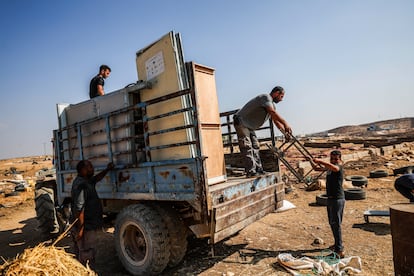

Khirbet Zanuta no longer exists. The 250 inhabitants of this precarious locality in the inhospitable hills south of the West Bank city of Hebron held their own for three years, but the attacks and threats from ultranationalist Israeli settlers following the Hamas attack have become so bad that they have resigned themselves to dismantling their houses and putting them back together a few miles away, in the hope that physical distance will protect them.
The trucks are loaded with animal feed, mattresses and pieces of tin and wood from their shacks. On the back of a truck, there is a poster for an international cooperation project that today seems almost sarcastic. “Humanitarian support for Palestinians at risk of forced relocation in the West Bank,” it reads. It was financed by the European Union and several EU countries, as can be seen from the logos.
The “risk” of forced relocations existed before the current war in Gaza, but it has risen since then. Between 2022 and last October 7, more than 1,100 people, mainly Bedouins who live from agriculture and livestock, had to dismantle their communities and look for a new home due to the violence of Israeli settlers — a trend international organizations and NGOs described as worrying. These communities move to other places in the West Bank, a few miles from where they lived. Six communities were completely displaced and 20 were partially displaced, according to September data from the United Nations Office for the Coordination of Humanitarian Affairs (OCHA).
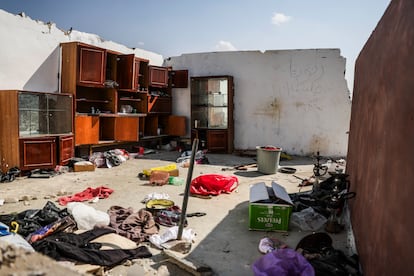
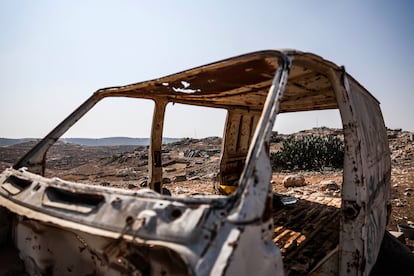
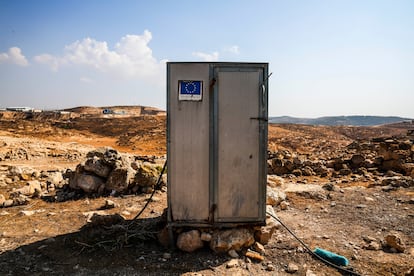
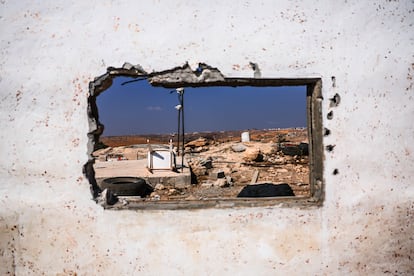
With the West Bank at boiling point and all eyes on Gaza, this number has skyrocketed. In just four weeks, nearly the same number of people have been displaced as in the previous 21 months: 821 people, 313 of them children, according to the OCHA. On the one hand, the prevailing desire for revenge means it is unlikely that Israeli soldiers will protect the Palestinians against the radical settlers, who seek payback against all Palestinians for the Hamas attack which killed 1,400 people.
And it’s not just the feeling of rising impunity that is pushing the Palestinians out. The military mobilization of settlers is another factor. Some religious ultranationalist settlers are among the more than 300,000 reservists who have been called up, but they are serving at the same base. In other words, settlers who before October 7 were only allowed to have a handgun and had no authority, now can now wear military uniforms and carry long guns.
Since the start of the war, there has been an average of seven settler-related incidents every day in the West Bank, according to OCHA data. In the first eight months of the year — when religious ultranationalism gained unprecedented influence in the Israeli government — that figure was three, and marked the highest daily average since the U.N. began keeping records in 2006.
In Khirbet Zanuta, Abdul Halim al Til, 40, describes how the situation has deteriorated. A few years ago, he took out his cattle (his main source of income) without any problem. Then, the settlers began to enter at night to empty his water tanks (the town cannot connect to the running water network) and scare the livestock with drones. “Since the war began, we do not dare to advance more than a few meters. The army will come soon,” he says, while apologizing for not being able to offer anything more than a glass of hot Cola-Cola.
“Here, living is impossible now, and life is the most important thing. There is no security. Since the war began, settlers and soldiers come every day, at dawn and dusk. They hit people, they burn houses, they break windows, or they empty our water tanks,” says Moaz al Til, as he stands among what remains of Khirbet Zanuta.
For Palestinians in the West Bank, it is no longer clear if the settlers are coming to attack with the support of soldiers, or if they are all soldiers. “There are settlers that we knew by sight, that we knew were coming from the settlement, and now they come in uniform,” says Moaz. Last week, he says, they put a rifle to his father’s head and told him: “If you don’t leave, we will kill you all.”
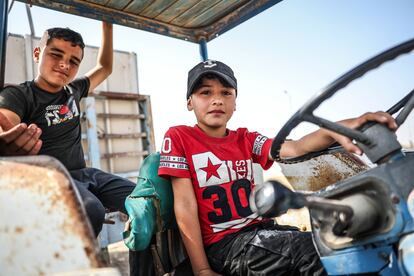
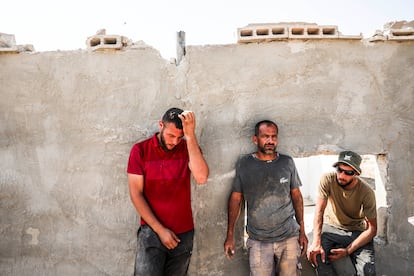
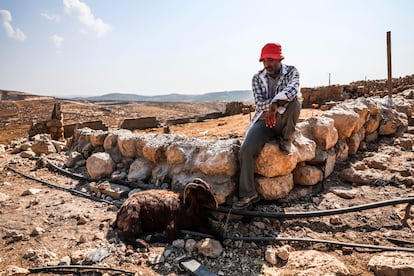
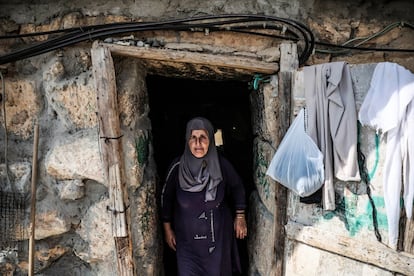
Parallel legal systems
Khirbet Zanuta is in Area C, the largest (60%) of the three zones into which the West Bank was divided by the Oslo Accords in 1993. Here, the Israeli army has full control, both administrative and security. Half a million Jewish settlers and 300,000 Palestinians live there, with two parallel legal systems: Israeli civil law, for the former, and martial law, for the latter. Palestinians are virtually prohibited from building in Area C: more than 90% of requests are rejected and there is a demolition every two days. They build without permission and often do not even request it. What’s more, the more than 200 livestock communities not “recognized” by Israel, such as Khirbet Zanuta, cannot connect to the electricity or water grid, and all their buildings — whether shacks, cement homes, agricultural structures or solar panels — are considered illegal.
“Today we cannot distinguish between settlers and soldiers […] There are settlers that we know, about whom we have filed complaints, we have seen them beating up others. Today they are the army, they have the law in their hands,” says Nawaya, recalling that a soldier with whom he had never had problems recently told them: “We are going to blow up your house, like in Gaza.” “These days they look at us as if all Palestinians had carried out the attack [on October 7],” he laments.
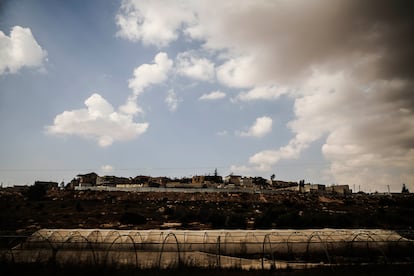
For years, Area C has been a battleground for land due to Israeli religious nationalism. In 2021, Uri Jever, the director of the regional council of the Kiryat Arba settlement, said it was important to look for points of agricultural development and go after them. “There is a saying in Arabic: ‘Abandoned property teaches people to steal.’ What we don’t use, what we don’t grab, someone else will come and grab,” he said in an online conference organized by Amana, an organization that promotes colonization.
This summer, Israel demolished the school in Ein Samia, one of six villages that had been forcibly removed before the Hamas war. Built with EU funds, the school was the only building standing after the village’s residents dismantled the community two months earlier. “The state of Israel will not allow illegal construction and Arab takeover of the open spaces,” said Finance Minister Bezalel Smotrich, who is responsible for civil affairs in the area.
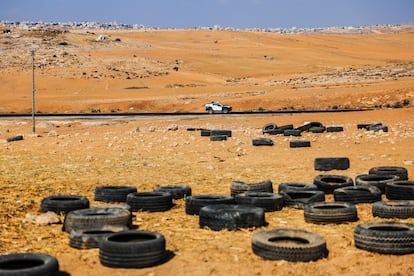
Sign up for our weekly newsletter to get more English-language news coverage from EL PAÍS USA Edition
Tu suscripción se está usando en otro dispositivo
¿Quieres añadir otro usuario a tu suscripción?
Si continúas leyendo en este dispositivo, no se podrá leer en el otro.
FlechaTu suscripción se está usando en otro dispositivo y solo puedes acceder a EL PAÍS desde un dispositivo a la vez.
Si quieres compartir tu cuenta, cambia tu suscripción a la modalidad Premium, así podrás añadir otro usuario. Cada uno accederá con su propia cuenta de email, lo que os permitirá personalizar vuestra experiencia en EL PAÍS.
¿Tienes una suscripción de empresa? Accede aquí para contratar más cuentas.
En el caso de no saber quién está usando tu cuenta, te recomendamos cambiar tu contraseña aquí.
Si decides continuar compartiendo tu cuenta, este mensaje se mostrará en tu dispositivo y en el de la otra persona que está usando tu cuenta de forma indefinida, afectando a tu experiencia de lectura. Puedes consultar aquí los términos y condiciones de la suscripción digital.








































